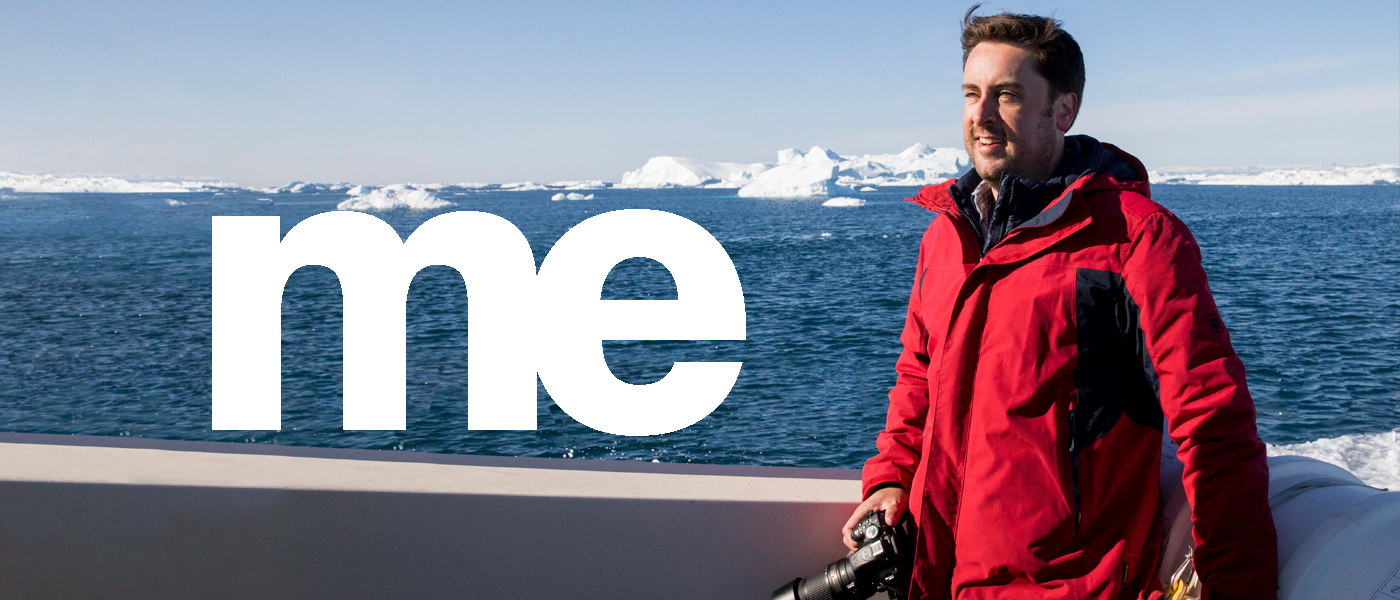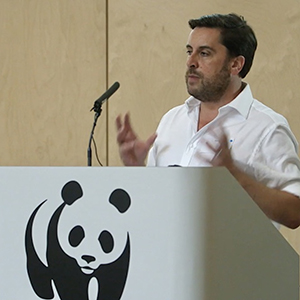
Me by Gareth Redmond-King
A longstanding passion for protecting the environment has led Gareth Redmond-King (MA 1998) to the role of COP26 lead at the Energy & Climate Intelligence Unit, a non-profit organisation working to support informed debate on climate change in the UK. In the run-up to the crucial United Nations COP26 climate change conference in Glasgow this November, Gareth is working to bring together politicians, journalists and experts on the climate issues that will be central to the outcome the conference needs to achieve.
What ambitions do you have for your role as COP26 lead?
I’m working to grow understanding of just how important this COP is, in a global sense. We’re six years on from Paris, so countries need to be committing to higher ambitions and getting us closer to the Paris Agreement aim of keeping global warming to 1.5 degrees.
There’s a huge job to be done at COP26. Paris 2015 was the high-water mark of global collaboration, but at Glasgow, countries should be ramping up their ambition to deliver much stronger emissions pledges."
What would you regard as a successful COP26?
We need real money from rich countries to support poorer countries to take climate action, real plans to deliver emissions cuts, and real-world action to end the harmful stuff, like reliance on coal and deforestation. It’s hugely complex, which is why I’m really hoping it’s in person because that’s how it will be most effective. Big countries already have loud voices and COPs are unusual in that the smaller developing countries are incredibly important in the discussions. Anything that makes it harder for them to be part of the discussions – like holding it remotely or via some sort of hybrid model due to COVID restrictions – is a problem. So apart from the fact that Glasgow is a great place and any excuse for me to come back there is very welcome, it also facilitates the negotiations and makes it much more likely that countries will be able to reach agreement.
Your career has centred around working for organisations that strive to protect the environment. Where does your commitment to working towards a more sustainable world come from? I’d like to give you a nice story about when I first connected to nature, but it’s just always been really important to me. I’ve always loved nature and wildlife and it’s one of those things where I never understood why everybody isn’t as fascinated by it as I am! And why everybody isn’t as afraid of the harm we’re doing to it as I am.
Which green initiative are you most proud of having worked on over the course of your career?
When I worked for the Department for Energy and Climate Change [a UK Government department], we were responsible for subsidising renewable power – making it easier, cheaper and faster for companies to develop this technology. I’m proud of what it achieved as now, more than a third of our power comes from renewables. I’m also proud to have been part of the campaign to press for the UK to commit to working towards net zero – it was a really effective campaign which mobilised a lot of powerful voices like scientists and businesses and the UK became the first major economy to put a net-zero target into law.
What do you see as the biggest barriers to reversing climate change?
Lack of political courage and leadership. Too often, politicians avoid difficult conversations about how we change our transport choices – drive less, fly less – and how to make the alternatives more cost-effective; difficult conversations about eating less meat, for example. We don’t have to completely give up cars or give up eating all meat forever, it’s not a world of hair shirts and pain, but the transition itself is complex, and we have to find the ways to do it together.
Using our voice is the most powerful thing we can do. MPs don’t hear from us enough about this and there are still those who believe tackling climate change and protecting the environment is a contentious issue."
And what are you most hopeful about?
What gives me hope is that the whole picture has already changed so rapidly. There are companies falling over themselves to commit to net zero – hundreds of companies, globally, signed up to science-based targets. Some of them, to be frank, may be gaming it – making it sound as though they will plant a few trees over there and you can carry on filling up your car with their petrol over here. But even the big polluting companies – in whose interest it is that we carry on relying on fossil fuels – feel they actually have to address this now.
Considering your degree is in English Literature & Politics, how did you end up working in the field that you are?
Well, I used to think that I wanted to be a politician; I no longer think that! But if I had started out doing something completely different, I think that by now, I would have been doing this – it’s something I care enough about that I would have found my way to it one way or another. I never had fantasies of being an astronaut or a footballer or anything.
How do you think we can tackle our love affair with the car?
I like to think we’ll look back at our relationship with cars and just shake our heads in horror at how we let vehicles get as big and polluting as they are, how we squeezed out pedestrians and cyclists to make way for these enormous, really quite dangerous things that take up so much public space. I hope our future will start to look a bit more like it does in a city in Holland, Denmark or Germany, where people mainly walk and cycle and then there is a bit of space for vehicles.
What changes have you made in your own life as a result of the need to reduce our personal carbon footprints? I stopped eating meat a few years back, largely for environmental reasons. It just felt odd for me to go to a wetland centre and admire all these species of ducks and geese and then go somewhere and maybe eat one of them – that cognitive dissonance thing. We hardly fly now, my home is pretty green, we’ve got solar panels and we’re quite energy efficient.
What’s the one thing we could all be doing to live more sustainably?
I don’t like the idea of dictating to people that you ought to do this or that – everyone’s circumstances are different. Some people have family on the other side of the world who they won’t see if they just give up flying. But one of the most important things that literally all of us could do more of at any time is to just speak up about it to politicians, councillors and businesses. Talking about it is the most high-impact thing that we can do – including to friends and family, actually.
Gareth’s memories of Glasgow
I enjoyed the study most of the time, but I was quite involved in student politics. So I’d sometimes skive off the work to do stuff in the SRC – I spent an inordinate amount of time in their offices in the John McIntyre Building.
I was a QM-er – I was briefly on the board, actually – and I loved wandering through the Gilbert Scott Building to go to lectures. It’s a beautiful building.
One of my fondest memories is of the 1996 Rectorial election contest. I ran Richard Wilson’s campaign and the whole thing was so much fun, with some bonkers politics involved. Richard really threw himself into the campaigning, as he did with the job when he was successfully elected.
I like seeing the names of people who are still at Glasgow from when I was. Bob Maslen was an English Lit lecturer in my first year, and I spotted his name in a theatre programme when I was at the Globe a couple of years ago.
I still love Glasgow; it’s just got so much character and history and culture and life. I loved it around the West End, the bars and restaurants, Ashton Lane. Obviously, I couldn’t afford The Ubiquitous Chip when I was a student, but it’s become a favourite since! I certainly hope to make a pilgrimage to the Chip when I’m in Glasgow for the COP.
Gareth plans to keep working in the area of international collaboration to tackle climate change for the foreseeable future. His personal ambitions include more train journeys, more wildlife and more photography. “In the ‘before’ times,” – before COVID, he says – “I liked going out for nice dinners, going to the theatre and travelling to new cities. My husband and I really like just settling down on a comfortable train and finding ourselves in a completely different place.”
@gredmond76
This article was first published September 2021.

Photo top: Tristan Fewings
Above: courtesy of Gareth Redmond-King
QUICKFIRE
Biggest hero?
Obvious choice, but Nelson Mandela.
Biggest achievement?
Running the New York Marathon. Never thought I’d run that far and couldn’t now.
Biggest challenge?
Monday mornings.
Biggest regret?
I decided life is too short for regrets.
Guilty pleasure?
Malt whisky.
Most treasured possession?
My camera – if I was parted from it, that would be the thing I’d miss most.

